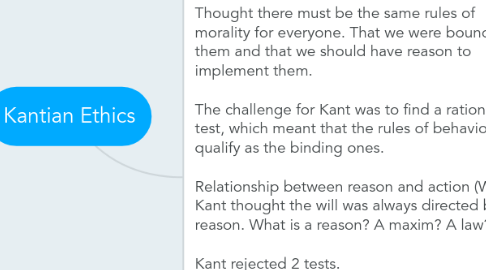Kantian Ethics
Door Anna Bromely


1. Kant (1724 - 1804) Thought there must be the same rules of morality for everyone. That we were bound by them and that we should have reason to implement them. The challenge for Kant was to find a rational test, which meant that the rules of behaviour qualify as the binding ones. Relationship between reason and action (Will). Kant thought the will was always directed by reason. What is a reason? A maxim? A law? Kant rejected 2 tests. 1.Obedience to happiness 2.God Kant believed that human nature could not ground morality - only our rational nature
1.1. "Ought implies can" If you ought (obligation) to do something it is only an 'ought' if it is possible for you to do so. Like going to lectures, rather than flying to Beijing and doing them there in 2 hours, which is not possible, so is not an 'ought'.
1.2. Kant had 3 tests - 1. Universal Law (Formal criterion) - Adopting maxims that you could will to be universal laws. 4 examples given split into perfect and imperfect duties. E.g. Though shall not kill - perfect duty What must I do to develop myself - imperfect duty. Categorical laws command unconditionality Hypothetical laws depend on conditions - split into 2 conditions. 1.Technical. e.g. put diesel in a diesel car. 2. Prudential. e.g I wish to be happy or qualify in my degree 2. Humanity (Rationality of persons) - Treat people as an end, never as a means ONLY. ONLY is really important because Kant is not saying that we shouldn't treat people as means. Just that we should not ONLY treat them so. E.g. a dentist - you treat as a means to get your teeth fixed but you engage in respectful reciprocity, you pay for your treatment. (This is what Kant means) Determine ends through rational choice of what is worthwhile Causation - When I will something I begin a whole sequence of consequences. There is a crucial chain. Material/Physical causes important 3. Kingdom of Ends (Community of persons)- Everyone comes together and is legislating. A harmonized kingdom of ends. ` Kants vision was for an autonomous, mutually respectful, reasoned society. Possible ideal? Autonomy - 'I give the law to myself' (Kant's preference) Heteronomy - 'the other gives the law to myself' To make everyone jog at 6am and give up alcohol cannot be a ration law by general universality. It cannot be made universal. People are united and purposes are united, but perhaps there are nuances?
1.2.1. Question - Are all 3 tests identical in nature in the end?
1.2.2. Kant thought that morality must be done because it is the right thing to do. He said that God will reward virtue. This means that we have to postulate a God in Kant's moral theory. however, if you remove God, you just remove the part whereby the agent is rewarded. Rest of the theory still holds.
